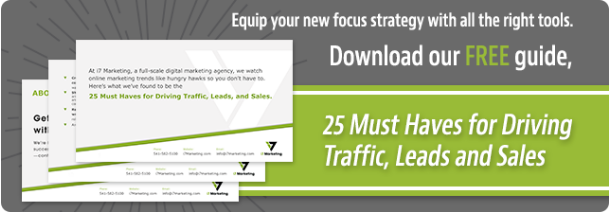There are two types of copy: descriptive and persuasive. You can use either type of copy, but results can differ.
The type of website copy you have on each page can lead the reader in a certain direction. There is a distinct difference between where you lead a reader when you use descriptive copy as opposed to persuasive copy. The former provides valuable information, the latter is designed to persuade the reader to buy.
Descriptive Copy: Just the Plain and Dry Facts
Descriptive copy is what you find on most websites. The purpose of descriptive copy is to inform. It basically tells the reader about the features of your company, culture, products and services. This type of content can be helpful to readers who are interested in facts and details and want to learn more.
Descriptive copy is ideal as educational content. If your company sells a technology product or one that requires your customers to assemble or use in multiple ways, then you’ll likely have descriptive copy. Educational content is helpful to support the before and after sale of a product.
For example, companies that sell health care or wellness products support the sale of their products with descriptive content about the science behind the product or problem the product is helping to remedy. Another example is automotive service companies that provide information about the maintenance of your vehicle.
One of the most popular ways that companies use descriptive copy is for content marketing and SEO. Content marketing is a strategy you can use to attract a target audience and develop a trusted relationship that, over time, may generate new sales. Content marketing can build your credibility as the expert in your designated field.
There are two advantages to content marketing. The first is that it can increase your rankings on search engines. This in turn can help you attract customers on the Internet that you otherwise would not get. The more articles you publish on the Internet, the more likely your prospective customers will find you when they search for key terms on the search engines.
The second advantage is that it allows you to communicate with your customers and prospects without selling. Instead of pitching your products or services, you can deliver information that enhances the intelligence of your buyer. The premise for this strategy is if you deliver ongoing valuable information to buyers, they ultimately will buy from you and remain loyal.
Persuasive Copy
Persuasive copy is the type of writing that sells your products and services. Imagine having copy on your website that can close sales. That could mean more customers and higher short and long term revenues. Yet very few companies have persuasive copy on their websites. If you do, then you’ll have a competitive advantage.
Persuasive copy is what makes direct marketing so effective. This includes not only direct mail and direct response advertising, but also email marketing and landing pages. In fact, when you create a landing page to sell your product online, you need persuasive copy and not descriptive copy to close the sale.
You can have persuasive copy throughout your website. For example, persuasive copy on your homepage can help you increase the number of visitors who provide you with their email address. This can translate into great sales from prospects with whom you otherwise would not have been able to follow up. Persuasive copy on your product or service page can seduce the reader to contact you or even buy the product online. The bottom line is your website should be more about selling than just informing.
Persuasive copy is NOT about deceiving readers or being overly aggressive or pushy. It’s about pushing the emotional buttons in your reader that fulfills unmet needs and desires. The more emotional they get, the bigger their desire for your product.
There are two big advantages you get from having persuasive copy on your website. The first is that it can help you attract more new customers. The second is you can increase your sales per transaction. That’s because you’ve stimulated their emotions, making them more apt to buy more now.
Summary
The biggest difference is that descriptive copy is logical and persuasive copy is emotional. Without inciting emotion in your audience, you limit their purchasing behavior. Logic helps to justify an emotional decision, so the information you present in descriptive copy has some function. However, too much descriptive content can dilute the effect of persuasive copy.
Persuasive copy starts with and builds on emotion; you incite the reader to read your copy and compel them to buy your products or services now. That’s why your website should include persuasive copy and not just descriptive copy.




Submit a Comment
Your email address will not be published. Required fields are marked *